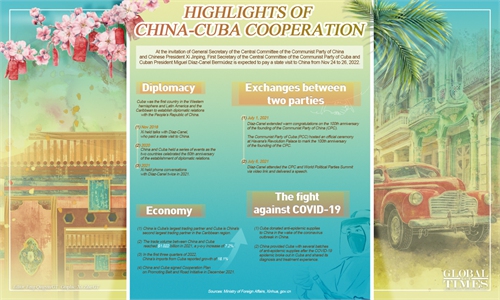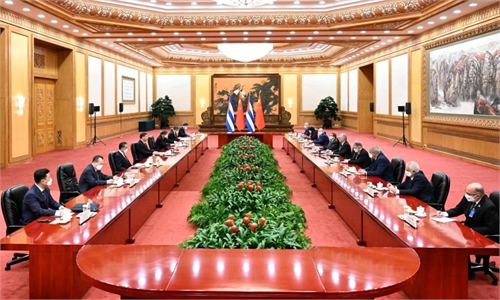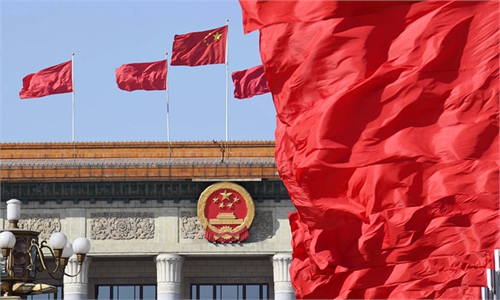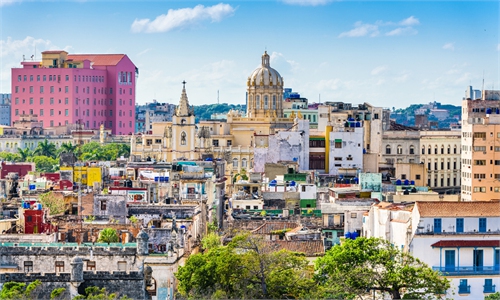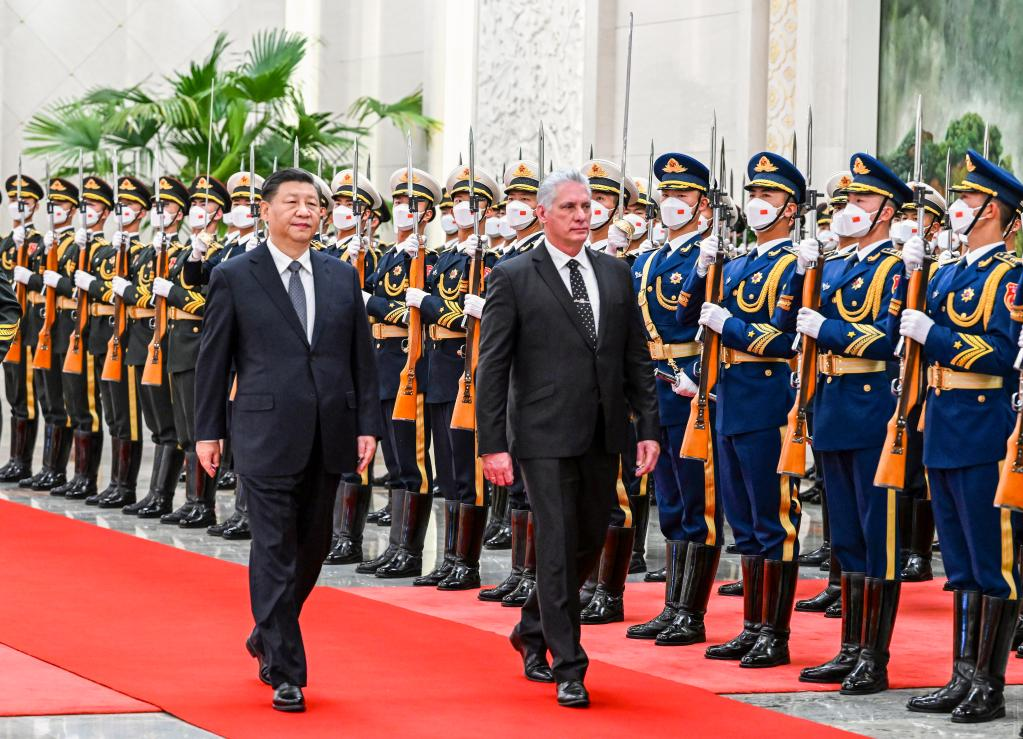
Xi Jinping, general secretary of the Communist Party of China (CPC) Central Committee and Chinese president, holds a ceremony to welcome Miguel Diaz-Canel Bermudez, first secretary of the Central Committee of the Communist Party of Cuba and Cuban president, prior to their talks at the Great Hall of the People in Beijing, capital of China, Nov 25, 2022. Photo:Xinhua
China and Cuba on Friday vowed to deepen practical cooperation under the Belt and Road Initiative (BRI) cooperation plan, firmly support each other on issues concerning each other's core interests, strengthen coordination in international and regional affairs as well as jointly build socialism with local characteristics, during a meeting between Xi Jinping, general secretary of the Communist Party of China (CPC) Central Committee and Chinese president, and Miguel Diaz-Canel Bermudez, first secretary of the Central Committee of the Communist Party of Cuba and Cuban president.
The two leaders witnessed the signing of bilateral documents regarding inter-party exchanges, BRI cooperation and a consultation mechanism between their foreign ministries.
The two sides also issued an 18-point joint statement on deepening China-Cuba relations in the new era. Cuba reiterates its firm position of unconditionally abiding by the one-China principle, stressing that Cuba firmly opposes any attempt to use the Taiwan question to interfere in China's internal affairs.
China firmly supports the Cuban people in their just struggle to defend national sovereignty and oppose external interference and blockades. China supports ending the economic, commercial and financial embargo against Cuba, according to the joint statement.
The two sides agreed to deepen high-quality BRI cooperation and strengthen cooperation in areas such as biotechnology, renewable energy, health, economy, trade, finance and cyber security, and China will continue to provide support and assistance to Cuba within its capacity, the statement said.
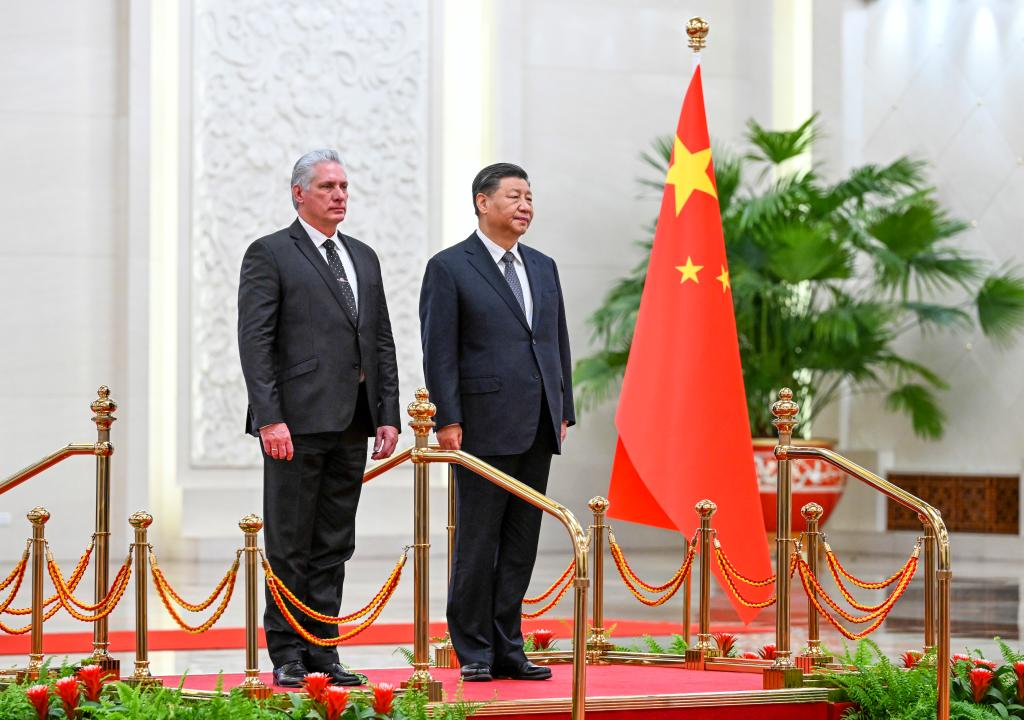
Xi Jinping, general secretary of the Communist Party of China (CPC) Central Committee and Chinese president, holds a ceremony to welcome Miguel Diaz-Canel Bermudez, first secretary of the Central Committee of the Communist Party of Cuba and Cuban president, prior to their talks at the Great Hall of the People in Beijing, capital of China, Nov 25, 2022.Photo:Xinhua
Chinese observers said Diaz-Canel's visit came amid recent frequent visits of leaders from socialist countries, showing that these countries are deepening exchanges in theory and practice, and as they are also developing countries, the exchanges also let the world hear stronger voices from developing nations, which is conducive to promoting a world order that is fairer and more just as the US and West attempt to split the world through bloc confrontation and ideology.
Observers stressed that China-Cuba cooperation and China-Latin America cooperation benefit both sides and do not target any third party, and the steadily growing bilateral trade between China and countries in the region showed that the US is failing in its attempt to push aside China in the region that Washington long deems as its "sphere of influence" for geopolitical aims.
Xi, general secretary of the Communist Party of China (CPC) Central Committee and Chinese president, said to Diaz-Canel, first secretary of the Central Committee of the Communist Party of Cuba and Cuban president, that Diaz-Canel is the first Latin American and Caribbean head of state received by China since the 20th CPC National Congress held last month, which fully demonstrates the special friendship between the two countries and parties.
"Cuba is the first country in the Western Hemisphere that established diplomatic relations with the People's Republic of China. Our ties have become an example of solidarity and cooperation between socialist countries, as well as an example of sincere mutual assistance between developing countries," Xi said.
Li Haidong, a professor from the Institute of International Relations at the China Foreign Affairs University, told the Global Times on Friday that the "special friendship" between the two countries and two parties mentioned by Xi was embodied in the long-term friendship of the two socialist countries since the two established diplomatic ties, as Cuba was the first country in the so-called "backyard" of the US in Latin America to establish diplomatic relations with China, which laid the foundation for other Latin American countries to establish diplomatic ties with China, and the two sides enjoy a friendship forged by the older generation of leaders, which has become a precious legacy of the two countries that should be cherished and consolidated.
The two parties in China and Cuba have united and led their peoples to withstand various negative influences from the international and domestic environment, overcome risks and challenges through great struggles, and can also support and coordinate with each other to defend fairness and justice in multilateral and international affairs, showing the strong vitality of the Marxist party and the socialist system, Pan Deng, executive director of the Latin American and Caribbean Region Law Center of China University of Political Science and Law, told the Global Times.
According to Cuban news agency Prensa Latina, Diaz-Canel travelled with several senior officials, including Deputy Prime Ministers Ricardo Cabrisas and Alejandro Gil, Foreign Minister Bruno Rodriguez, and Ministers Rodrigo Malmierca (Foreign Trade and Foreign Investment) and Vicente de la O (Energy and Mines).
Cuba's delegation includes several senior officials from different sectors, which showed that Cuba wants to comprehensively boost ties with China, analysts said.
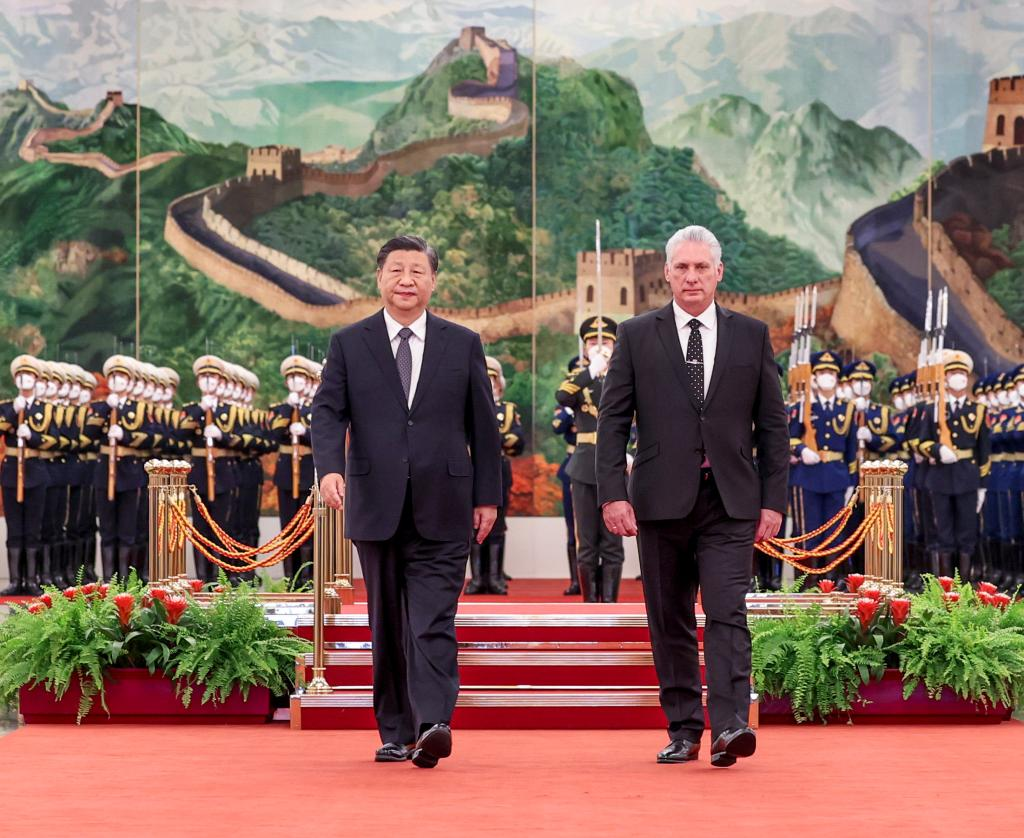
Xi Jinping, general secretary of the Communist Party of China (CPC) Central Committee and Chinese president, holds a ceremony to welcome Miguel Diaz-Canel Bermudez, first secretary of the Central Committee of the Communist Party of Cuba and Cuban president, prior to their talks at the Great Hall of the People in Beijing, capital of China, Nov 25, 2022.Photo:Xinhua
Han Han, secretary general of the Center for the Cuba Studies Institute of Latin American Studies under the Chinese Academy of Social Science, told the Global Times on Friday that China and Cuba have always maintained frequent and consistent bilateral exchanges between the leaders and the two ruling parties, and this is key to promoting China-Cuba ties as well as to ensuring policy coherence and smooth implementation of pragmatic cooperation under the BRI.
Energy prices have continued to rise with increasing global demand, posing a great challenge to Caribbean countries like Cuba that depend greatly on external energy supplies, Han said. She said improving energy supplies, building power plants and more infrastructure are crucial for Cuba to realize its development goals, and in these fields, China and Cuba could strengthen their win-win cooperation.
China is receiving intensive visits recently from socialist countries, including previous visits by general secretary of the Communist Party of Vietnam Central Committee Nguyen Phu Trong and Lao President Thongloun Sisoulith in the coming week.
The current international order is at a crossroads in which the US and the West are forming cliques and encouraging decoupling, and many socialist countries which are also developing countries are working hand-in-hand with other developing countries to push the international order to a more just and fair direction and to promote the development of a multi-polar world, Chinese observers said.
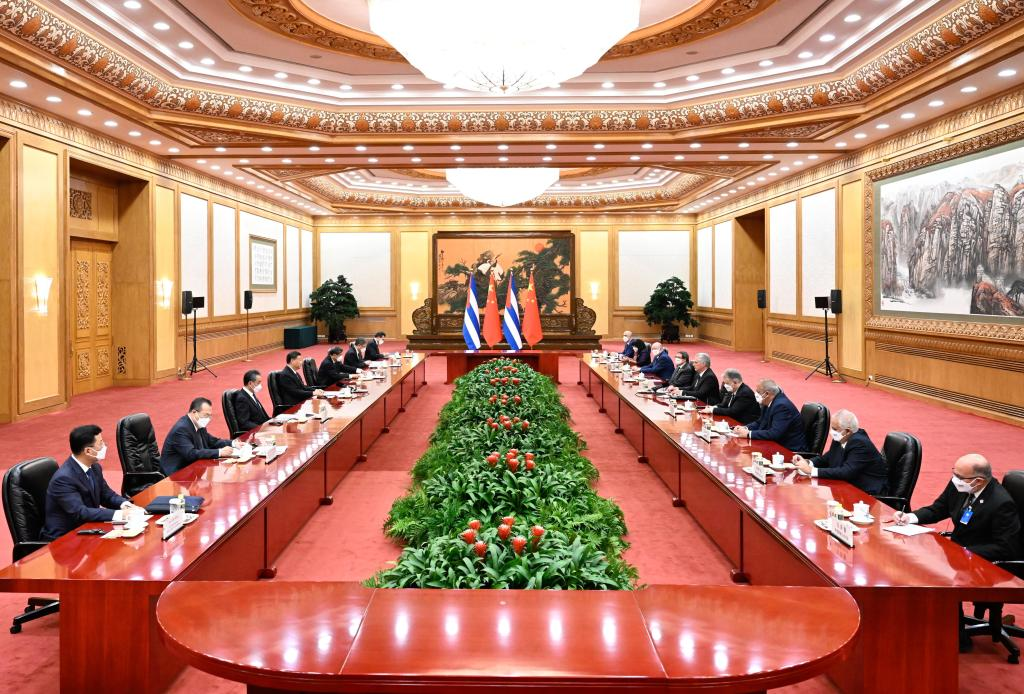
Xi Jinping, general secretary of the Communist Party of China (CPC) Central Committee and Chinese president, holds talks with Miguel Diaz-Canel Bermudez, first secretary of the Central Committee of the Communist Party of Cuba and Cuban president, at the Great Hall of the People in Beijing, capital of China, Nov 25, 2022. Photo:Xinhua
Vanguard in Latin America
China-Latin America cooperation is based on mutual respect and benefit, which serves the common interests of countries in the region, and China stands ready to work with Cuba and other Latin American and Caribbean countries to advance high-quality BRI cooperation and promote greater development of China-Latin America comprehensive cooperative partnership in the new era, Xi said.
Cuba is a bellwether country in Latin America and the spiritual vanguard of the leftist, socialist and anti-America forces in the region, as it has remained unbroken in the face of US pressure and blockades, Li said, adding that Cuba is a model of independence and self-reliance in Latin America.
To date, about two-thirds of Latin American countries have elected leftist governments, most of which pursue a "Latin America of Latin Americans" and are keen to promote strategic independence from US influence, Chinese observers said.
Strengthening ties with countries like China has expanded the space for Latin American countries to make strategic choices and boosted their strategic independence and confidence, observers said.
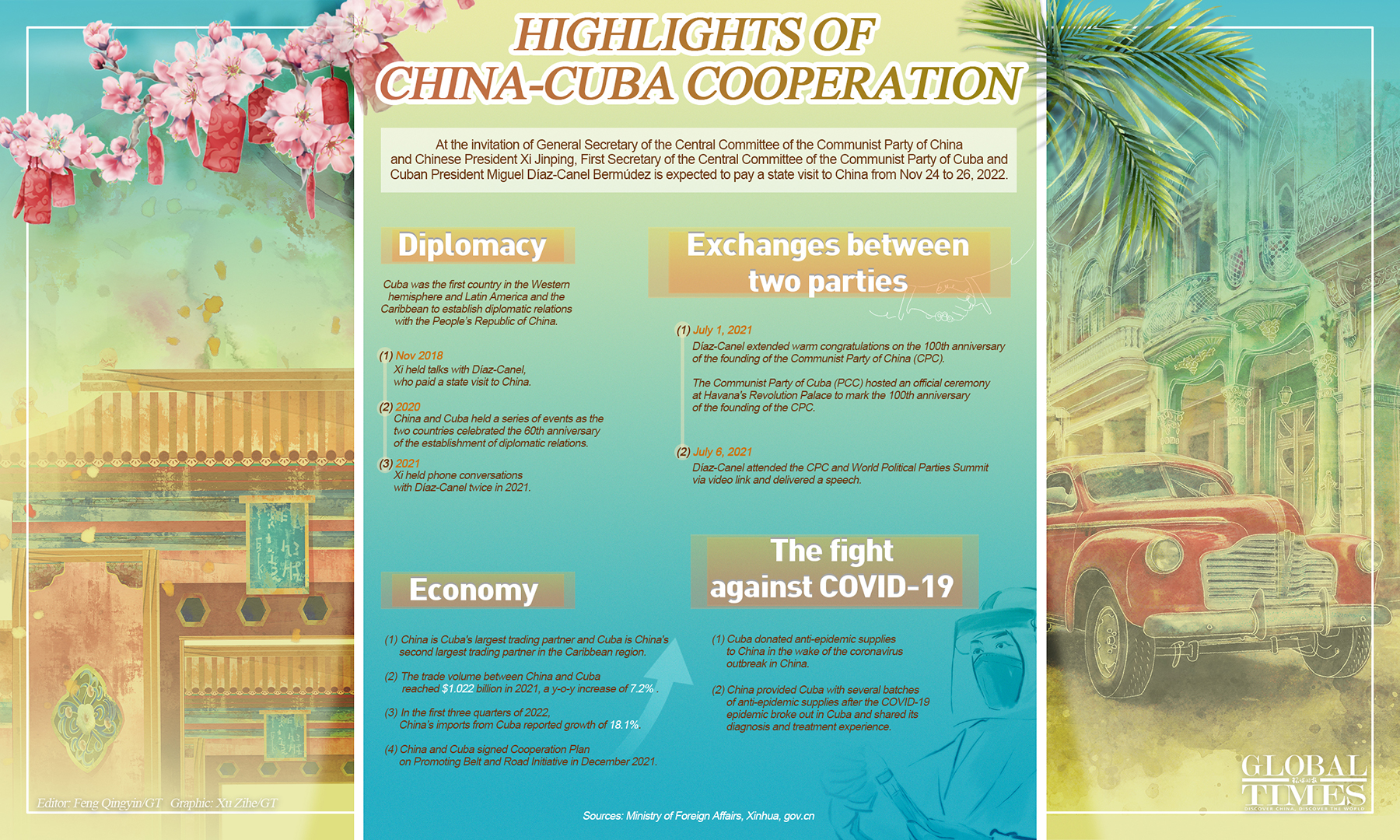
Highlights of China-Cuba cooperation. Editor: Feng Qingyin/GT Graphic: Xu Zihe/GT
China-Latin America economic and trade cooperation has overcome the adverse impact of the pandemic, showing strong resilience and development momentum, Shu Jueting, spokesperson from the Ministry of Commerce (MOFCOM), said on Thursday.
Wang Youming, director of the Institute of Developing Countries at the China Institute of International Studies in Beijing, told the Global Times on Friday that China's cooperation with Latin America is based on mutual respect and benefit that local people welcome, and does not target any third party.
In sharp contrast, any moves by China in the region will be interpreted by the US as intruding in its "sphere of influence," and the Biden administration has introduced several plans that attempt to elbow aside BRI, but apparently failed, as what the US offers cannot be implemented or bring any tangible benefits to local people, Wang said.
Playing geopolitical tricks and promoting protectionism can only hurt the US itself, Wang said.
Many Western media outlets began seeing the tendency of US influence fading in Latin America back in June, when several countries in the region skipped the US-held Summit of the Americas.
Bloomberg said that the boycotts, bluster and lackluster pledges made at the summit from countries in the region exposed the "shaky state" of US influence in Latin America.



